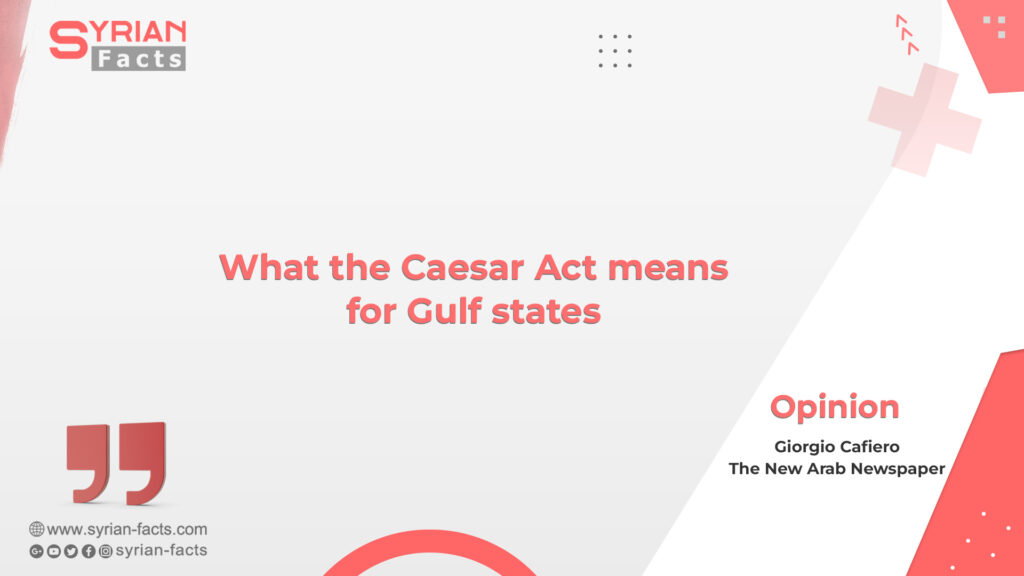Analysis: Sanctions have so far prevented the United Arab Emirates, Saudi Arabia, and other Arab states from making significant investments in Syria following the regional normalisation of Bashar al-Assad’s regime.
The Arab League’s decision to restore Syria’s membership in the pan-Arab organisation earlier this year marked a watershed moment in the rehabilitation of President Bashar al-Assad’s image at a regional level. In upcoming months, Syria’s renormalisation process is set to expand.
Among Arab statesmen, the trend is in favour of shoring up the Damascus government and supporting Syria’s reconstruction and redevelopment following 12 years of brutal war.
Yet, Western sanctions have, at least thus far, prevented the United Arab Emirates (UAE), Saudi Arabia, and other Arab states from making significant investments in Syria.
The US’s Caesar Act, in particular, has cut off Syria from much of the international economy, largely due to its secondary sanctions that would target non-US-based entities should they do business in Syrian regime-controlled parts of the country. For example, soon after the Caesar Act came into effect the Lebanese company CSC Group stopped servicing Syrian ATMs.
Questions about Syria’s status will likely constitute some friction between Abu Dhabi and Riyadh, on one side, and Washington, on the other.
But it is worth asking questions about how much longer Gulf Cooperation Council (GCC) states that have reconciled with Assad’s government will continue being deterred from investing in Syria because of US pressure and sanctions threats.
Underscored by many high-profile visits to the UAE and Saudi Arabia in the past two years, team Biden values Washington’s partnerships with both GCC members and wants to avoid further aggravating tensions with Abu Dhabi and Riyadh.
The Biden White House, like previous US administrations, has relied on the UAE and Saudi Arabia in many ways. A recent example is the crisis in Sudan, where Saudi Arabia has attempted to mediate between the Sudanese Armed Forces and the Rapid Support Forces while hosting US-supported talks in Jeddah.
The UAE also belongs to the so-called Quad, which pursues diplomatic efforts vis-à-vis Sudan in coordination with the United Nations.
Within this context, some experts doubt that the US leadership would impose sanctions on either the UAE or Saudi Arabia if these Gulf states were found guilty of violating the Caesar Act.
“The US might be politically apprehensive about this normalisation process but does not seem willing at this time to jeopardise its bilateral relationships with key Arab [partners] involved in the process, particularly Saudi Arabia and the UAE,” Dr Khalil E. Jahshan, the Executive Director of Arab Center Washington DC, told The New Arab.
He added that “US relations with these two countries, in particular, are too important for the Biden Administration to subjugate, at this critical time in the region, to the rigid application of the provisions of the Caesar Act”.
Other experts agree. “The Biden administration has not taken any meaningful steps to discourage Gulf partners from returning Assad to the Arab League,” said Gordon Gray, the former US ambassador to Tunisia, in a TNA interview.
“I do not see any appetite in the Biden administration for more robust engagement on Syria, so I doubt it has any real desire to impose sanctions on either Saudi Arabia or the UAE.”
Although the UAE and Saudi Arabia want to grow their networks in Syria while helping the country rebuild, neither Gulf power is necessarily interested in adding more friction to the relationship with the US if avoiding that outcome is possible.
“Abu Dhabi and Riyadh have openly declared their desire to exercise a measure of ‘strategic autonomy’ vis-à-vis the United States. At the same time, they are keen to maintain their close military cooperation with the US and to continue to remain under the American security umbrella,” said Dr Mehran Kamrava, a Professor of Government at Georgetown University Qatar, in a TNA interview.
“Therefore, whatever tactic they may adopt, they will be careful not to openly alienate or to antagonise the United States in the process.”
If necessary, the Emiratis and Saudis could use third parties as a conduit for investments, commercial activities, and business in Syria to avoid problems with Washington while the Caesar Act is in effect.
Putting money into Syria for humanitarian purposes and reconstruction could be done through NGOs and the United Nations. Abu Dhabi and Riyadh may also have some luck in terms of convincing Washington to make exemptions for GCC states that are putting money into Syria for humanitarian objectives.
The New Arab Newspaper





Be the first to write a comment.